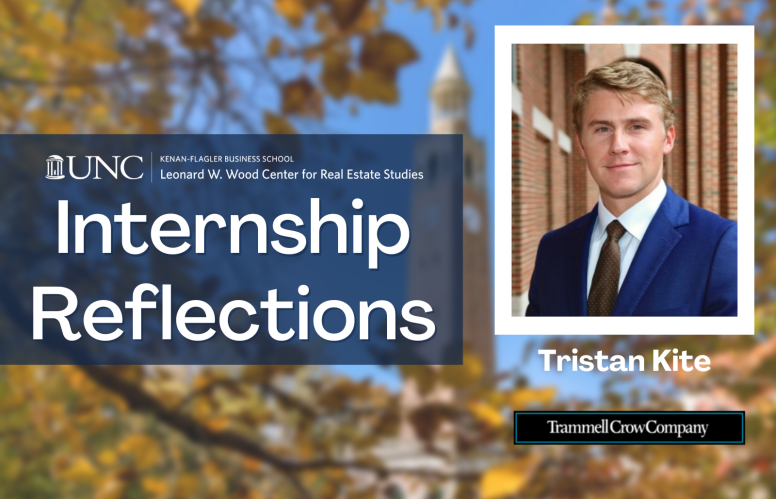Perspectives
Kite: There is no substitute for the real world experience gained during his internship

The Wood Center amplifies the voices of students taking part in real estate-focused summer experiences in a student-produced series called Internship Reflections. Hear first-hand about the amazing professional development, project sites, and real-world real estate opportunities these students are being exposed to.
By Tristan Kite
This summer, I interned with Trammell Crow Company‘s Atlanta office, working with their industrial development team. Trammell Crow has been a major player in U.S. real estate for decades, so it was incredible to get an inside look at how they approach complex projects—especially in a market like Atlanta where things are always shifting.
What struck me most was realizing how interconnected everything in development is. Zoning, permitting, financing, contracts—it really is this delicate dance where if one piece falls out of place, the whole deal can collapse. I’d always thought about real estate in terms of numbers and site plans, but seeing it up close showed me how much timing, sequencing, and communication matter. My experience with the Wood Center for Real Estate and as a student fund manager helped me gain insight into how deals are executed, but there’s no substitute for real-world experience when it comes to seeing how deals actually come together. It made me appreciate the legal frameworks that keep these deals moving, and I’m excited to dive deeper into that in my Real Estate Law and Development class this fall.
My main project focused on finding redevelopment opportunities in older, underused sites around the city. I was looking for obsolete retail, office, or industrial properties that could be transformed into modern industrial space. It meant diving into market analysis—studying submarket trends, lease comparables, construction costs—to figure out what deals would actually become an attractive investment. What made it particularly interesting was seeing how demand for last-mile logistics and data infrastructure is suddenly making these tight urban sites valuable again.
One of the most eye-opening parts was getting exposed to the data center world. With AI and cloud computing driving massive demand for digital infrastructure, I learned about power availability, transmission constraints, and how developers are navigating capacity issues across the Southeast. It revealed this fascinating intersection of real estate and technology that’s incredibly complex but full of opportunity.
Going into the summer, I knew I was interested in real estate, but I came out with a much clearer sense of direction. I’m drawn to industrial development and the role it plays in supporting modern commerce and technology. As I head into my second year, I’m excited to keep exploring where traditional real estate meets the infrastructure that powers our economy.